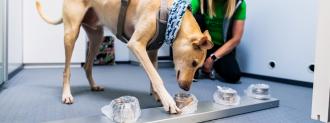Travelers at Helsinki Airport in Finland now have the option of undergoing free COVID-19 screening. But it won’t be a lab tech analyzing nose samples — it’ll be a team of dogs that can smell coronavirus in human sweat.
This Helsinki Airport pilot study is the largest of its kind, and if it goes well, detection dogs could soon play a role in helping the world curb the pandemic.
Training Dogs That Can Smell Coronavirus
Dogs have an incredibly keen sense of smell, and with the right training, they can use it to help humans track down everything from bombs to bed bugs.
Some dogs can even sniff out signs of disease or infection in people, so, soon after the pandemic, several research groups launched studies to see if it was possible to train dogs that can smell coronavirus, too.
If so, these hounds could provide a noninvasive way to rapidly screen people for the virus and wouldn’t require any testing supplies or expensive lab equipment.
Several of the groups have since shared incredibly promising results of those efforts, including researchers at the University of Helsinki.
In May, they reported that they’d trained several dogs to distinguish between the urine samples of healthy people and people with COVID-19.
Since then, the group has gone on to train its dogs to smell coronavirus in a sample of a person’s sweat, with near 100% accuracy — even days before symptoms appear.
The Helsinki Trial
As of September 22, four dogs that can smell coronavirus are on duty at the Helsinki Airport, offering free voluntary screenings to travelers, and another six dogs are still in training.
The screenings start with the traveler running a clean wipe over their neck and dropping it into a cup. The cup is then presented to one of the dogs, which remains in a separate booth the whole time.
After about 10 seconds with the sample, the dog will either do nothing (indicating it doesn’t detect COVID-19) or make an alert its handler is trained to spot. In the latter cases, the handler will direct the traveler to the airport’s health information checkpoint.
The handlers will recommend that everyone who gets screened get tested afterwards, which will also reportedly help them keep track of the dogs’ accuracy (though it’s not clear from the news release how they plan to follow up with the travelers).
Detection Dogs Taking Off
Helsinki isn’t the first airport to deploy dogs that can smell coronavirus — in August, Dubai International Airport launched a similar program.
However, this four-month-long trial is the largest to date, so the data from it could provide our best indication yet of the utility of canine COVID-19 screeners.
You could open up society in another way if you had those dogs.
Anna Hielm-Björkman
Because detection dogs are expensive and time-consuming to train, they’d never be able to fully replace standard coronavirus tests.
However, they could serve as an additional weapon against the virus, possibly in places that require regular screenings, such as nursing homes and schools, according to trial leader Anna Hielm-Björkman.
“You could open up society in another way if you had those dogs,” she told the Washington Post.
We’d love to hear from you! If you have a comment about this article or if you have a tip for a future Freethink story, please email us at [email protected].






